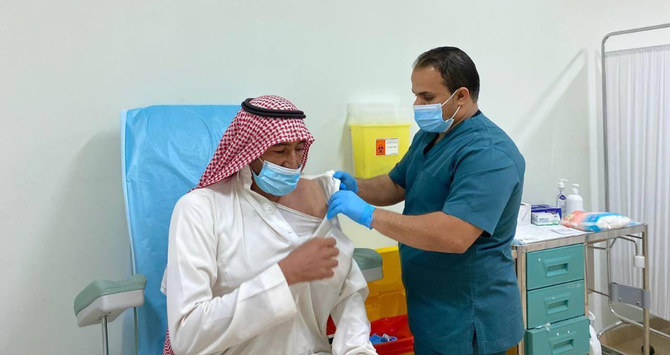JEDDAH: Only those who have taken two doses of COVID-19 vaccine will be considered immunized starting Oct. 10, following updates to Saudi Arabia’s government-approved Tawakkalna app, the Ministry of Health said on Sunday.
The update follows a recent decision from authorities requiring double vaccination to attend any economic, commercial, cultural, entertainment, sport, or tourism activity in Saudi Arabia starting from 6 a.m. on Oct. 10.
Tawakkalna was launched last year to help track COVID-19 infections. It has since updated to include vaccination information and infection status, while also functioning as a COVID-19 “passport.”
Those officially exempt from having the vaccine will not be affected by the new rule.
“Taking both doses of the vaccine is hugely important because it is the only way to protect society,” said Health Ministry spokesman Dr. Mohammed Al-Abd Al-Aly. “Recovering from COVID-19 is not enough by itself and a single dose after recovering from the disease is also not enough to confront mutants of the virus around the world.”
On Sunday, the ministry reported just 41 new cases and 49 new recoveries.
These latest figures bring the total number of COVID-19 cases to 547,262 and the number of recoveries to 536,330. A further two deaths were reported, raising the toll to 8,724.
FASTFACT
On Sunday, the ministry reported just 41 new cases and 49 new recoveries.
Of the new cases, 11 were in Riyadh, 10 were in Jeddah, and there were three in Alkhobar and Madinah.
There are currently 2,208 active cases, 181 of which are in critical care.
There have been more than 42.3 million COVID-19 vaccine doses administered in Saudi Arabia so far, with 53.5 percent of the country’s 34.8 million population completing the course.
The regions with the highest number of vaccinated residents are Baha with 68.6 percent, Riyadh with 68.3 percent, and the Eastern Province with 66.8 percent. In Jouf, 51.5 percent of residents have completed their vaccination course.
There were 46,499 PCR tests carried out in Saudi Arabia in the past 24 hours, raising the total number to over 29 million so far.
Last year, the Ministry of Hajj and Umrah launched procedures to enable the gradual return of pilgrims to the Two Holy Mosques after a seven-month hiatus due to the onset of COVID-19.
It plans to expand the capacity of Makkah’s Grand Mosque for pilgrims.
“Last year we announced the gradual increase in pilgrim capacity, the first phase of the plan with only 6,000 pilgrims allowed per day. The number gradually increased in every phase, reaching up to 70,000 pilgrims a day in recent days,” said ministry spokesman Hesham Abdulmonem Saeed. “We’re working with all relevant authorities to continue raising the daily quota in the next period, continue ensuring a safe journey for all visitors to the Two Holy Mosques, and ensure no COVID-19 infections. To this day, there has not been a single case and we will continue working on keeping the momentum going.”
The ministry has developed four main service centers to receive, gather and transport pilgrims safely, based on the adopted precautionary measures.
As of September, more than 21,000 Umrah visas were issued for those arriving from outside the Kingdom.
“This is positive evidence of the increase in demand rates for those coming to perform Umrah from outside the Kingdom,” Saeed added.
The first group of foreign Umrah pilgrims arrived in Saudi Arabia earlier in August after a temporary ban to curb the spread of COVID-19 was lifted.
They are required to present a certificate on arrival that has been validated in their home country and states details of them receiving a Kingdom-approved vaccine.
The Kingdom has approved vaccines from Moderna, Pfizer-BioNTech, Johnson & Johnson, and AstraZeneca.

















